#cardiac cirrhosis
Explore tagged Tumblr posts
Text

The Science Notebooks of Satyendra Sunkavally, page 51.
#plants#hydroxyproline#cardiac cirrhosis#hypoxaemia#halothane#liver#fat droplets#velocity of light#time dilation#diamond#refractive index#crystal#virus#longevity#cholestasis#staphylococcal#exotoxin
0 notes
Text
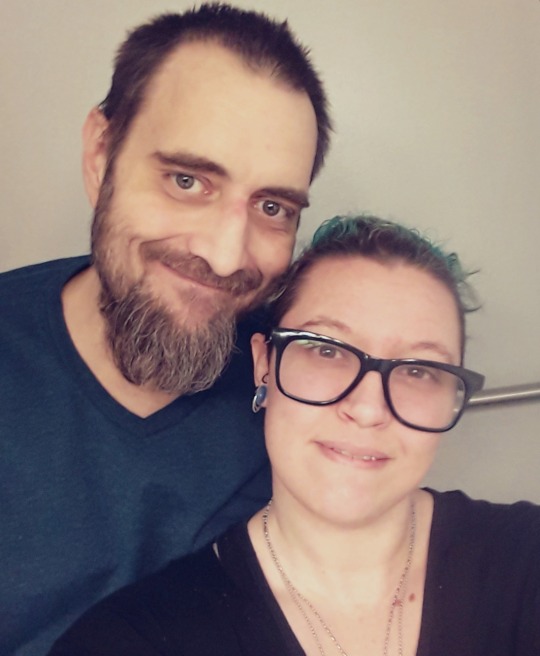
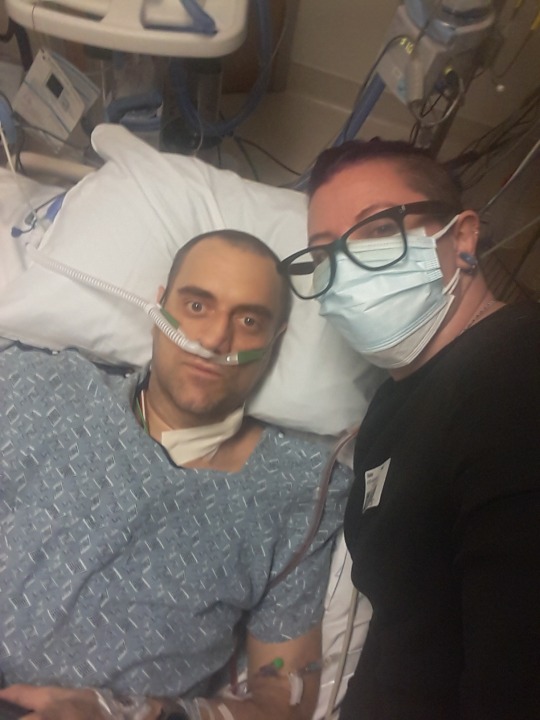
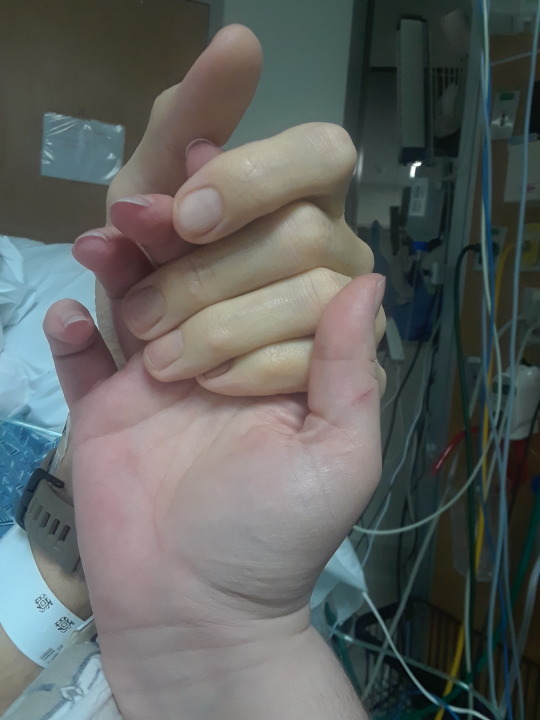
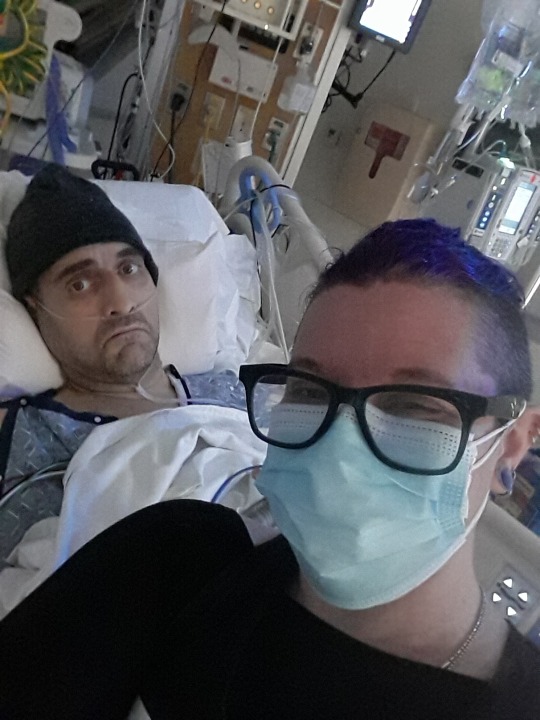
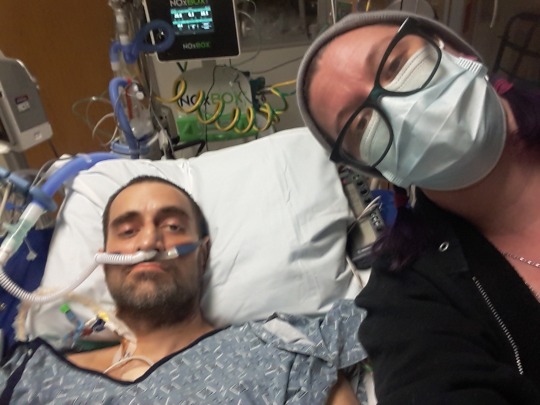
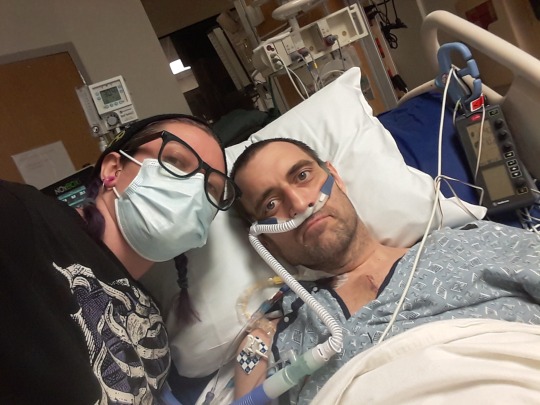
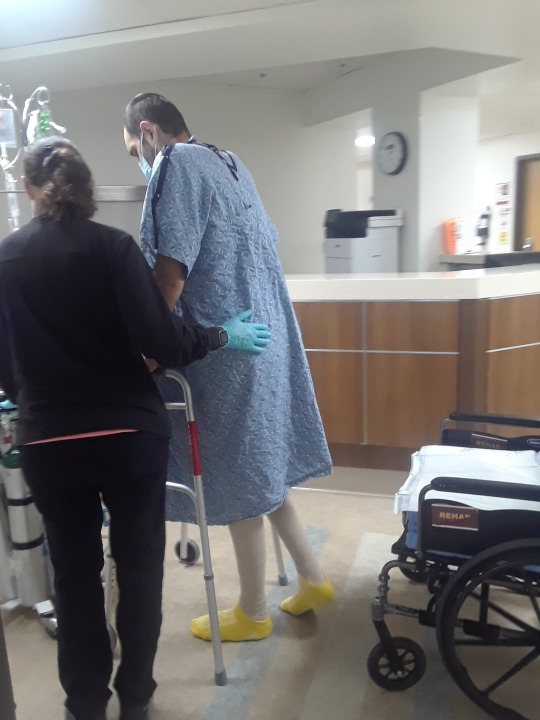
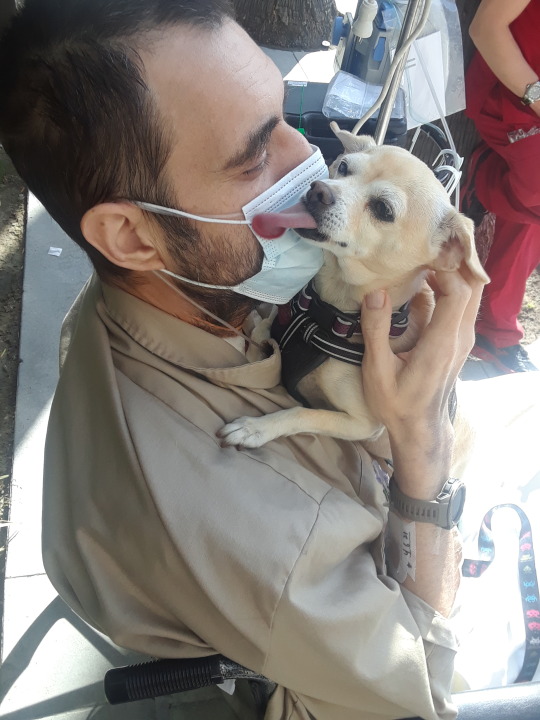
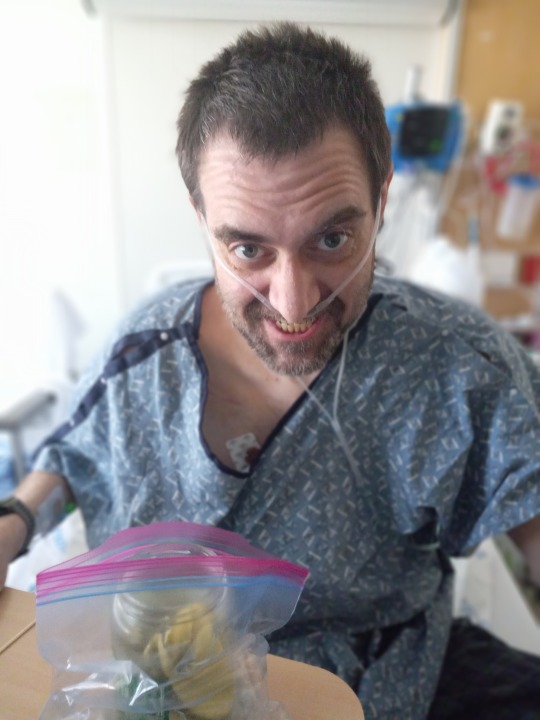

IDK that I've ever put it in one post before, but here's the transplant speedrun.
1 - Valentines day 2021, he's admitted to the hospital. We take a pre-hospital selfie then I shave his head and he shaves his beard because he doesn't want to deal with hair at the hospital. Me and his mom drop him off; at that point you can only visit someone as they are actually dying and we're told that he's going to stay in the hospital until he gets a transplant or he dies, and if he's rejected as a transplant recipient he'll receive palliative care in this hospital.
2 - First week of March, they allow patients to have one screened visitor; this is our first visit - I take photos in the hospital to show his mom because at this point he has a pump in his shoulder and it is difficult for him to move his arms to use his phone. He has also been confined to a bed since the week he arrived because he's on the ECMO machine, so he can't walk or move around, though they stand him up every once in a while. At one point one of the ecmo tubes pulls out of his femoral artery, which is Not! Great! He also needed a blood transfusion about every two days at that point, which worried the doctors because it increased his likelihood of rejecting. But he had been approved for transplant at that point!
The first thing he said to me on this visit was "look, I have abs" and then he showed me his abs because it turns out when you're really really dying of heart failure your body begins to eat itself.
3 - Now That's What I Call Jaundice (cardiac cirrhosis is liver failure as a result of heart failure and it's pretty much the big giant neon flashing sign of heart failure that says "hey you're fucking dying" so if you've got heart failure and your bilirubin number is off or the whites of your eyes are yellow please kick up a gigantic stink until they check your liver; large bastard's GP, who is my doctor, who I hate, saw his bloodwork with a very high bilirubin number a month before he was diagnosed with cardiac cirrhosis and wrote it off as a testing fluke fuck that guy)
4 - Don't let the sad face fool you, he's acting pathetic so that his mom will stop yelling about the fact that I'm bringing him cookies. He's allowed to have cookies. At that point he weighed 98kg and was outsourcing his heartbeat, he was allowed to eat whatever he wanted. (have i mentioned that I was moving us from Vegas to LA at this time? I was bringing him cookies because I'd baked hundreds of peanut butter cookies and other cookies to use up the flour, sugar, and peanut butter in the vegas house)
5 - Mid-march, he's got a match! He called me when I was in Vegas filling up the truck with another load and I drove right back and to the hospital. Once he went in for surgery I drove to his mom's house and crashed, then woke up and drove to our storage unit and unpacked the truck while I waited to hear from the doctors. I was unloading a bookcase when I got the call. (There wasn't any point in waiting alone in the hospital for sixteen hours; either he was going to make it or he wasn't and someone was going to have to unload the truck at some point. People have been weird about this, like I should have been sitting at his side all the time, but there was a two-hour daily limit for most visits and look i have sat in a waiting room while this dude had a thirteen hour surgery i do not need a repeat of that experience without the soothing balm of nicotine getting me through it; so unloading a truck it was)
6 - Two days after surgery and kind of mad about it. His chest hurt a lot (obviously) but, like, a lot a lot because they'd had to open him up for the bypass just two years earlier.
7 - First walk outside of his room after transplant in early April; he needed a LOT of PT because of how much muscle he'd lost. He lost sixty pounds in the hospital before the surgery, and only gained back about twenty while he was in there.
8 - A visit from the tiny doggo
9 - I come to visit and I've got a new phone with a portrait mode so he steals it and takes stupid pictures for a few minutes. Dude is bored and restless; this is in late april and he's feeling well enough to be moody. ETA: There is a jar of pickles in front of him because he'd been fluid limited for a long time and his salt levels were off and when he got to the hospital they were like "you need electrolytes and a lot of salt" and he was like "sweetheart can you please please please bring me delicious salty things" so I was bringing him jars of pickled mushrooms and garlic stuffed olives and just a huge number of pickles that he kept trying to share with the nurses. "Alli brought the mushrooms again; would you like a pickled mushroom? I have fancy toothpicks to share them with!"
10 - He comes home for the first time in early May; he ends up getting readmitted two more times because of complications before finally being released in early July. ETA: The second time he got readmitted it was for something that he wasn't at all worried about but that they needed to monitor for a couple weeks so he was *SO BORED* and actually feeling pretty okay; so at one point when I was leaving the parking garage at 8pm my car wouldn't start, I did some troubleshooting with the manual and the internet and didn't figure it out, so I called him and he tried to troubleshoot over the phone and got frustrated and was begging his nurses to let him come out to the parking structure to work on my car (they refused) - I ended up getting a tow and fixing it when I replaced the battery terminals.
Photos are all posted with his permission.
Also I dyed my hair purple between photos one and two because it's his favorite color. I also bought a blue dress, red tights, and yellow shoes to wear to visit him because he always teases me for wearing so much black.
I just love him a lot. It was a hard couple years there, but things are getting better.
430 notes
·
View notes
Text
How Does Jaundice Affect the Cardiovascular System?

Jaundice is a condition that primarily affects the liver but can have far-reaching impacts on other systems in the body, including the cardiovascular system. For those seeking jaundice treatment in Coimbatore, Dr. Vinoth Kumar, a specialist at GEM Hospital, offers expert care. Learn more about jaundice treatment in Coimbatore.
Understanding Jaundice and Its Systemic Effects
Jaundice occurs when there is an excess buildup of bilirubin, a yellow pigment, in the bloodstream. This leads to the characteristic yellowing of the skin, eyes, and mucous membranes. While the liver is the primary organ affected, the cardiovascular system can also experience significant strain due to the underlying causes and complications of jaundice.
How Jaundice Impacts the Cardiovascular System
The relationship between jaundice and the cardiovascular system is complex. Here are some key ways jaundice can affect heart health:
Increased Bilirubin Levels and Vascular StressElevated bilirubin can lead to oxidative stress, damaging the blood vessels and impairing circulation. This can increase the risk of atherosclerosis and other vascular issues.
Reduced Oxygen TransportWhen liver dysfunction causes anemia, it reduces the oxygen-carrying capacity of red blood cells, placing strain on the heart as it works harder to deliver oxygen to tissues.
Impact of Chronic Liver Disease on Cardiac FunctionConditions like cirrhosis can cause cardiac dysfunction, a phenomenon known as cirrhotic cardiomyopathy. This includes reduced responsiveness to stress and decreased contractility of the heart.
Fluid Retention and Heart StrainSevere jaundice and liver damage can lead to fluid retention, which increases blood volume and places additional strain on the heart, potentially causing conditions such as congestive heart failure.
The Link Between Jaundice and Cardiovascular Risk Factors
Patients with jaundice often exhibit several risk factors that can directly or indirectly impact cardiovascular health:
Inflammation: Persistent inflammation due to liver dysfunction can contribute to endothelial damage.
Electrolyte Imbalances: Common in jaundice, these imbalances can disrupt normal cardiac rhythms.
Portal Hypertension: Elevated pressure in the portal vein can indirectly stress the cardiovascular system.
Signs That Jaundice May Be Affecting the Heart
It’s crucial to recognize signs that jaundice may be impacting cardiovascular health:
Swelling in the legs or abdomen (edema)
Shortness of breath
Fatigue or dizziness
Irregular heartbeat
Low blood pressure
If you experience any of these symptoms, consult a specialist promptly.
Tips to Protect Cardiovascular Health During Jaundice
While treating the underlying cause of jaundice is essential, here are ways to support heart health:
Follow a Balanced Diet: Include heart-healthy foods like fruits, vegetables, whole grains, and lean protein.
Stay Hydrated: Proper hydration helps maintain blood volume and prevents complications.
Limit Sodium Intake: Reducing salt can prevent fluid retention.
Avoid Alcohol: Alcohol worsens liver damage and can indirectly affect heart health.
Monitor Symptoms Regularly: Keep track of any new or worsening cardiovascular symptoms.
Why Early Diagnosis and Treatment Are Critical
Addressing jaundice early is vital to prevent complications, including those affecting the heart. Comprehensive care ensures that both liver and cardiovascular issues are managed effectively. Dr. Vinoth Kumar’s expertise at GEM Hospital provides patients with personalized treatment plans designed to address the root cause of jaundice while minimizing its systemic effects.
Schedule Your Appointment at GEM Hospital
If you or a loved one are experiencing jaundice and are concerned about its impact on your overall health, including your cardiovascular system, don’t wait. Schedule an appointment with Dr. Vinoth Kumar at GEM Hospital for expert care. Early intervention can make a significant difference in your recovery and long-term health.
0 notes
Text
Agarwood benefits
17 Benefits of Agarwood Oud that You Should Know
1. East Asian Medicine:
Agarwood is prescribed in traditional East Asian medicine to promote the flow of qi, relieve pain, arrest vomiting by warming the stomach, and to relieve asthma (Anon., 1995a).
2. Chinese Medicine:
High-grade agarwood powder is prescribed in Chinese medicine (Yaacob, 1999).
High grade agarwood powder is also used in the production of pharmaceutical tinctures (Heuveling van Beek and Phillips, 1999).
3. Use as Liniment:
Malaysians use agarwood mixed with coconut oil as a liniment. Likewise Indians and chinese also use agarwood oil in their traditional medicine as a liniment for the treatment of various skin diseases. (Burkill (1966))
4. Rheumatism:
Agarwood oil is used in a boiled concoction to treat rheumatism and other body pain.(Burkill)
5. Jaundice:
Often-discarded uninfected wood is used as Kayu gaharu lemppong by Malaysians to treat jaundice and body pains. (Chakrabarty et al. (1994))
6. Smallpox and Abdominal Pain:
Agarwood has been noted for its use as a complex ointment for smallpox and for various abdominal complaints. (1930, cited in Chakrabarty et al., 1994)
7. Pleurisy:
Its use for the treatment of pleurisy is referenced in the Ayurvedic medicinal text the Susruta Samhita.
8. Nervous System Disorders:
When used in aromatherapy, agarwood oil may help to treat anxiety, stress, depression and other nervous system disorders.
9. Liver and Kidney:
Agarwood oil is used to treat cirrhosis of the liver and kidney problems.
10. Lung and Stomach Tumours:
Agarwood oil is used in the treatment of lung and stomach tumours.
11. Carminative Diuretic:
Agarwood oil is also used a carminative diuretic.
12. The Indian Council:
The Indian Council summarizes the properties of agarwood as follows: “Agarwood is considered stimulant, antiasthmatic, carminative, tonic, aphrodisiac and astringent. It is used in diarrhoea, dysentery, gout, rheumatism and paralysis.
13. The Cropwatch Organisation:
The Cropwatch Organisation similarly lists acknowledged merits of agarwood in Asian medical praxis as “warming,” “to relieve stuck energy particularly in the digestive and respiratory systems,” “to alleviate pain,” and “balancing effects” on “nervous and emotional disorders.”
14. Middle East and Bangladesh:
In Egypt, Arabia and throughout the northeast part of Bangladesh, agarwood is described as a stimulant, cardiac tonic and carminative (Bhuiyan et al., 2009).
15. China and Japan:
It is used as a traditional sedative, analgesic and digestive medicine in traditional Chinese and Japanese medicine (Abdullah et al., 2007; Liu et al., 2008).
16. Assam:
The water portion obtained as distillate after separating the oud oil during distillation process is used at present in Assam as an efficient stimulant and tonic fo the treatment of mental disorder and malnutrition
17. Miscellaneous:
The oud oil is used to treat illness during and after childbirth; to relieve spasms especially in the digestive and respiratory systems, abdominal pain, asthma, cancer (used as a general tonic), colic, chest congestion, diarrhea, hiccups, nausea, nerves and treatment of regurgitation (Burkill, 1966; Chakrabarty et al., 1994; Kim et al., 1997; Barden et al., 2000; Bhuiyan et al., 2009).
Agarwood is also prescribed for dropsy, as a carminative, a stimulant, for heart palpitations, and as a tonic taken particularly during pregnancy, after childbirth and for diseases of female genital organs (Chakrabarty et al., 1994).

0 notes
Text
Exploring the Benefits and Services of Sonography in Indore
Sonography, commonly known as ultrasound, has become an indispensable tool in modern healthcare. This non-invasive imaging technique is used for a variety of diagnostic purposes, from monitoring pregnancies to detecting and evaluating diseases. As the demand for accurate and efficient diagnostic tools grows, finding a reliable sonography centre in Indore becomes a priority for many patients.

In this article, we’ll delve into what sonography is, its benefits, various types of ultrasound services available, and how to choose the best sonography centre in Indore for your diagnostic needs.
What is Sonography?
Sonography or ultrasound is a medical imaging technique that uses high-frequency sound waves to create images of the inside of the body. Unlike traditional imaging methods like X-rays and CT scans, ultrasound doesn’t use radiation, making it a safer alternative, especially for pregnant women and young children. Sound waves bounce off tissues and organs, and the returning signals are used to create detailed images on a screen.
These images provide critical insights into the health of organs, tissues, and blood vessels, allowing doctors to diagnose and monitor various conditions.
Benefits of Sonography
Sonography offers several key advantages in diagnostics, including:
Non-invasive: No need for incisions or invasive procedures, making it safer for the patient.
No radiation: Unlike X-rays, ultrasound uses sound waves, which makes it a safer choice for certain patients, such as those who are pregnant.
Real-time imaging: Provides immediate feedback, allowing doctors to make decisions on the spot.
Versatility: Sonography is used in a wide range of medical fields, including obstetrics, cardiology, and musculoskeletal health.
Common Types of Sonography and Their Uses
Sonography is used for a variety of diagnostic purposes. Here are the most common types of ultrasound services and their key uses:
1. Obstetric Ultrasound (Pregnancy Ultrasound)
Obstetric ultrasound, also known as pregnancy ultrasound, is one of the most commonly used types of sonography. It plays an essential role in monitoring the development of the fetus, confirming the pregnancy, and identifying any potential complications.
Key Benefits:
Confirming Pregnancy: Early ultrasound can confirm the pregnancy and estimate the due date.
Monitoring Fetal Development: It helps track the growth, movement, and overall health of the fetus.
Detecting Complications: Ultrasounds can detect conditions like ectopic pregnancy, abnormal growth, or placental issues early on.
For expecting mothers, choosing the best obstetric ultrasound in Indore clinic ensures they receive reliable and timely information about their pregnancy.
2. Abdominal Ultrasound
Abdominal ultrasound is used to examine organs in the abdomen, including the liver, pancreas, kidneys, and gallbladder. This type of ultrasound helps identify conditions such as kidney stones, liver diseases, and tumors.
Key Benefits:
Detecting Liver Disease: Helps in diagnosing liver conditions like cirrhosis or fatty liver.
Identifying Gallstones and Kidney Stones: Abdominal ultrasound is effective in detecting gallstones, kidney stones, and bladder conditions.
Diagnosing Abdominal Tumors: It can also help detect tumors in abdominal organs.
3. Pelvic Ultrasound
Pelvic ultrasound is often used to examine the reproductive organs, including the uterus and ovaries. It is a key diagnostic tool for gynecological conditions such as fibroids, cysts, and other abnormalities.
Key Benefits:
Diagnosing Gynecological Conditions: It helps identify fibroids, ovarian cysts, and other conditions related to the uterus and ovaries.
Investigating Pelvic Pain: Pelvic ultrasound is often used to diagnose the cause of pelvic pain, irregular bleeding, or abnormal discharge.
Assessing Reproductive Health: It’s essential for assessing women’s reproductive health and fertility.
4. Cardiac Ultrasound (Echocardiography)
Cardiac ultrasound, or echocardiography, helps examine the heart’s function and structure. It allows doctors to visualize the heart's chambers, valves, and blood flow, aiding in the diagnosis of cardiovascular diseases.
Key Benefits:
Monitoring Heart Function: It helps in detecting heart defects, abnormal blood flow, or valve diseases.
Evaluating Blood Flow: Echocardiography is vital for assessing how blood flows through the heart and vessels.
Non-invasive Heart Examination: It is a safe and effective way to monitor heart health.
5. Musculoskeletal Ultrasound
Musculoskeletal ultrasound is used to examine the muscles, ligaments, and tendons, helping diagnose conditions related to injuries, inflammation, and other musculoskeletal disorders.
Key Benefits:
Diagnosing Muscle and Ligament Injuries: It helps identify sprains, tears, or strains in muscles and ligaments.
Assessing Joint Conditions: The ultrasound can reveal conditions such as tendonitis or fluid buildup in joints.
Guiding Treatment: Ultrasound is also used to guide injections or other therapeutic procedures for musculoskeletal conditions.
Why Choose the Best Sonography Centre in Indore?
When seeking sonography services in Indore, it’s important to find a reliable, high-quality diagnostic centre. Here’s how you can choose the best sonography centre in Indore for your needs:
1. Qualified and Experienced Professionals
A good diagnostic centre should have certified sonographers and radiologists with extensive experience in performing and interpreting ultrasound scans. The right expertise ensures that you receive accurate and reliable results.
2. State-of-the-Art Equipment
Choose a sonography centre in Indore that uses the latest technology and high-resolution ultrasound machines. Advanced equipment provides clearer and more accurate images, which are essential for proper diagnosis.
3. Range of Services
Look for centres that offer a wide range of sonography services. Whether you need an obstetric ultrasound service in Indore, pregnancy ultrasound, or diagnostic scans for other health conditions, a well-rounded diagnostic centre will meet all your needs.
4. Patient-Centered Care
The best centres prioritize patient comfort and safety. A professional and caring staff will ensure that you feel at ease during the procedure and provide clear instructions.
5. Accreditation and Reviews
Check the credentials and accreditation of the centre. Additionally, positive reviews and recommendations from other patients can give you confidence in the centre’s quality of care.
Some highly-rated sonography centres in Indore include:
UltraScan Diagnostics
Indore Imaging Centre
Indore Women's Ultrasound Clinic
These centres are known for their expertise in providing a range of sonography services, including best obstetric ultrasound in Indore and specialized diagnostic imaging.
Why You Should Prioritize Pregnancy Ultrasound in Indore
For expecting mothers, choosing the right pregnancy ultrasound in Indore clinic is crucial for both the safety of the mother and the developing baby. A good ultrasound centre will provide detailed and accurate information regarding fetal development, helping to detect any potential issues early.
Benefits of Early Pregnancy Ultrasound:
Confirming Healthy Pregnancy: Early ultrasounds confirm pregnancy and help establish a due date.
Detecting Abnormalities: Detecting conditions like ectopic pregnancy, birth defects, or multiple pregnancies at an early stage.
Assessing Fetal Growth: Regular ultrasounds monitor fetal size, movement, and overall development, ensuring the baby is healthy.
Frequently Asked Questions About Sonography
1. How is sonography different from other imaging techniques?
Sonography uses sound waves to create images, whereas other imaging techniques like X-rays and CT scans use radiation. Sonography is safer for patients, especially pregnant women, as it doesn’t involve any exposure to radiation.
2. What should I expect during a sonography procedure?
During a sonography procedure, a gel is applied to the area being examined. A transducer is then moved over the area to capture images using sound waves. The procedure is painless, and you can typically expect to receive the results immediately after the scan.
3. Is sonography safe during pregnancy?
Yes, sonography is completely safe during pregnancy. It is non-invasive and does not use radiation, making it one of the safest methods for monitoring the health of both the mother and the baby.
Conclusion: Find the Right Sonography Centre in Indore for Your Needs
Sonography is a vital diagnostic tool that helps doctors and healthcare professionals monitor and diagnose various medical conditions. Whether you’re seeking pregnancy ultrasound in Indore, an abdominal ultrasound, or a specialized cardiac ultrasound, choosing the best sonography centre in Indore ensures you receive accurate results and quality care.
At UltraScan Diagnostics, we are committed to providing the best sonography services in Indore. Our team of experienced sonographers and advanced equipment guarantee reliable and timely results.
contact us:
78695 24599
451-G Greater Brajeshwari,Near Kerala Bakery,Pipliyahana Road, Pipliyahana, indore, Madhya Pradesh 452016
0 notes
Text
A Leading Multispecialty Healthcare Facility in India
Kokilaben Dhirubhai Ambani Hospital, located in the heart of Mumbai, is one of the leading multispecialty hospitals in India. Since its inception, the hospital has set a benchmark in offering world-class medical services, cutting-edge technology, and personalized care. With its patient-centric approach and commitment to excellence, Kokilaben Hospital has become a trusted name for patients seeking treatment across a broad spectrum of medical specialties.
State-of-the-Art Infrastructure and Technology
One of the key differentiators of Kokilaben Hospital is its modern infrastructure and the adoption of advanced technology. Equipped with over 750 beds, the hospital offers comprehensive medical care across 27 specialty departments, covering areas such as cardiology, oncology, neurology, orthopedics, and many others.
The hospital features highly specialized equipment for diagnostic and treatment purposes, including state-of-the-art imaging facilities like MRI, CT scans, and PET-CT, ensuring precise diagnosis. Furthermore, its advanced operation theaters and intensive care units are designed to handle complex surgeries and critical cases, making it a go-to destination for patients from across the country and overseas.
Comprehensive Range of Specialties
Kokilaben Hospital is known for its multidisciplinary approach, bringing together some of the finest doctors and medical professionals in each specialty. Here’s an overview of some of the core specialties that the hospital offers:
1. Cardiology and Cardiovascular Surgery
The hospital’s Heart Institute is renowned for providing comprehensive cardiac care. From preventive cardiology to complex heart surgeries, the department offers a full range of services. The expert team includes interventional cardiologists, cardiac surgeons, and electrophysiologists. Procedures such as angioplasty, pacemaker implantation, and bypass surgeries are performed using the latest techniques, ensuring minimal recovery time.
2. Oncology (Cancer Care)
Kokilaben Hospital's Centre for Cancer provides holistic cancer treatment, covering medical, surgical, and radiation oncology. With a focus on early detection and advanced treatment protocols, the center offers specialized care for cancers such as breast, lung, colorectal, and gynecological cancers. The hospital also has dedicated pediatric oncology services, making it a trusted name for cancer care in India.
3. Neurology and Neurosurgery
The Centre for Neurosciences is a key department at Kokilaben Hospital, offering both diagnostic and therapeutic services for neurological conditions. Whether it's treating epilepsy, stroke, or neurodegenerative diseases like Parkinson’s, the hospital uses a multidisciplinary approach, combining expertise from neurologists, neurosurgeons, and rehabilitation specialists. Complex surgeries like brain tumor removal, spine surgery, and treatment for aneurysms are regularly performed with high success rates.
4. Orthopedics and Joint Replacement
The Department of Orthopedics at Kokilaben Hospital is known for providing advanced treatment for musculoskeletal disorders, including joint replacement surgeries, spine surgeries, and sports injuries. The hospital offers minimally invasive surgical techniques that reduce pain and recovery time, allowing patients to return to their normal activities quickly. The use of robotic technology in joint replacement surgeries ensures greater precision and better outcomes.
5. Gastroenterology and Hepatology
Kokilaben Hospital’s Gastroenterology and Hepatology department provides comprehensive care for digestive and liver diseases. From treating common conditions like acid reflux and irritable bowel syndrome to managing complex liver diseases, including cirrhosis and liver transplants, the hospital is equipped to handle a wide range of cases. The team of gastroenterologists, hepatologists, and surgeons work closely to provide personalized treatment plans for each patient.
6. Obstetrics and Gynecology
The hospital has an excellent Department of Obstetrics and Gynecology, offering everything from routine prenatal care to high-risk pregnancy management. The team is also well-versed in gynecologic surgeries, including laparoscopic and robotic-assisted procedures for conditions like fibroids, endometriosis, and ovarian cysts. Comprehensive fertility treatments, including IVF, are also available at the hospital’s fertility center, helping many couples achieve their dream of parenthood.
Patient-Centric Care
What sets Kokilaben Hospital apart is its unwavering focus on patient care. The hospital follows a patient-first approach, where every treatment plan is tailored to meet the unique needs of each individual. From the moment a patient enters the facility, they are greeted with compassionate care and a dedicated team that ensures every step of their treatment journey is seamless.
In addition to medical care, the hospital offers various support services such as patient counseling, dietetics, rehabilitation, and physiotherapy. The well-being of the patient is at the core of all operations, and the hospital’s staff ensures that patients and their families feel comfortable and supported throughout their stay.
International Patient Care
Kokilaben Hospital has become a top destination for medical tourism, attracting patients from all over the world. The hospital’s dedicated international patient care team assists foreign patients with everything from travel arrangements to accommodation and post-treatment follow-ups. The combination of world-class medical expertise, competitive pricing, and personalized services has made Kokilaben Hospital a popular choice for international patients seeking high-quality healthcare.
Excellence in Research and Education
The hospital is also a center of excellence for medical research and education. It regularly conducts clinical trials, pushing the boundaries of medical science and contributing to the development of new treatment protocols. The hospital’s commitment to education is evident through its training programs for medical professionals, ensuring the next generation of doctors are well-equipped with the latest knowledge and skills.
Kokilaben Dhirubhai Ambani Hospital stands as a beacon of excellence in the Indian healthcare landscape. With its cutting-edge infrastructure, highly skilled medical professionals, and commitment to patient care, it has become a trusted institution for both domestic and international patients. Whether it's advanced surgeries, routine checkups, or complex medical conditions, the hospital offers a comprehensive range of services under one roof. For anyone seeking top-quality healthcare in Mumbai, Kokilaben Hospital is a name that guarantees expertise, compassion, and results, positioning it as one of the best multispecialty hospitals in India.
0 notes
Text
Understanding ECG and LFT Tests in Kandivali East: Services by Dr. Patil's Pathlab
In the bustling suburb of Kandivali East in Mumbai, accessing quality healthcare services such as ECG In Kandivali East and LFT tests is crucial for maintaining health and diagnosing various medical conditions. At Dr. Patil's Pathlab, we prioritize accurate diagnostics and patient care, offering state-of-the-art facilities and experienced medical professionals.
ECG (Electrocardiogram) in Kandivali East
An ECG is a diagnostic test that records the electrical activity of the heart over a period of time. It is commonly used to detect heart problems and assess the overall cardiac health of an individual. At Dr. Patil's Pathlab, located conveniently in Kandivali East, we provide comprehensive ECG services that are prompt, accurate, and conducted in a comfortable environment.
Importance of ECG Tests
ECGs are essential in diagnosing:
Arrhythmias: Irregular heartbeats.
Heart Attacks: Evidence of previous or current heart attacks.
Cardiomyopathy: Enlarged or weakened heart muscles.
Electrolyte Imbalances: Such as potassium or calcium.
Congenital Heart Defects: Present from birth.
Our Approach at Dr. Patil's Pathlab
We understand the importance of timely and accurate ECG results. Our facility is equipped with the latest ECG machines operated by skilled technicians under the supervision of experienced cardiologists. Patients in Kandivali East can rely on us for:
Accessibility: Convenient location and flexible timings.
Expert Diagnosis: Interpretation of results by qualified specialists.
Quality Care: Compassionate staff dedicated to patient comfort.
LFT (Liver Function Test) in Kandivali East
LFT is a group of blood tests that provide vital information about the state of a person's liver. These tests measure the levels of various enzymes, proteins, and substances produced or processed by the liver. At Dr. Patil's Pathlab, we offer comprehensive LFT services designed to detect liver diseases and monitor liver function accurately.
Importance of LFT Tests
LFT tests help in identifying:
Liver Infections: Such as hepatitis.
Liver Damage: Due to alcohol, drugs, or other toxins.
Liver Diseases: Including cirrhosis and fatty liver disease.
Bile Duct Obstruction: Issues with bile flow.
Response to Treatment: Monitoring ongoing liver conditions.
Our Commitment to Quality LFT Services
Patients in Kandivali East benefit from our:
Advanced Technology: Modern lab equipment for precise results.
Expert Interpretation: Analysis by experienced pathologists.
Comprehensive Reports: Detailed insights into liver health.
Why Choose Dr. Patil's Pathlab?
Expertise and Experience: Our team includes skilled technicians and specialist doctors who ensure accurate diagnostics.
State-of-the-Art Facility: We invest in the latest technology to deliver reliable results.
Patient-Centric Approach: We prioritize patient comfort and convenience, offering flexible scheduling and a welcoming environment.
Conclusion
Whether you need an ECG to assess your heart's condition or an LFT Test In Kandivali East to monitor liver health, Dr. Patil's Pathlab in Kandivali East is your trusted partner in diagnostics. Our commitment to quality, accuracy, and patient care sets us apart, ensuring that residents of Kandivali East have access to essential healthcare services right in their neighborhood.
For more information or to schedule an appointment, please contact us today. Your health is our priority at Dr. Patil's Pathlab.
#blood test lab in kandivali#diagnostics centre in kandivali east#pathology centre in kandivali east
0 notes
Text
Delving Into the Specializations of Internal Medicine
Internal medicine is a vast and intricate field that focuses on the comprehensive care of adults and addresses a broad spectrum of health issues. Internists, or internal medicine doctors, have extensive knowledge and skills to manage everything from routine health care to complex diseases. This article delves into the myriad specializations within internal medicine, highlighting the expertise and unique focus each brings to patient care.
General Internal Medicine
General internal medicine is at the heart of internal medicine. Specialists in this field provide holistic primary care for adults, handling acute and chronic medical conditions. They emphasize preventive care, health education, and the coordination of patient care involving various specialties. General internists often build long-term relationships with their patients, offering continuous and comprehensive care throughout their lives.
Cardiology
Cardiology is the specialty of internal medicine that deals with heart and vascular health. Cardiologists diagnose and treat a range of cardiovascular diseases, such as coronary artery disease, heart failure, arrhythmias, and hypertension. They utilize sophisticated diagnostic techniques like echocardiography, electrocardiograms, and cardiac catheterization. Interventional cardiologists perform procedures such as angioplasty and stenting to treat blocked arteries, which is critical in managing heart health.
Endocrinology
Endocrinology focuses on the endocrine system, which includes glands that secrete hormones regulating numerous body functions. Endocrinologists treat conditions such as diabetes, thyroid disorders, adrenal insufficiency, and metabolic bone diseases. They work closely with patients to manage chronic hormonal disorders, ensuring optimal hormone balance and overall well-being through personalized treatment plans.
Gastroenterology
Gastroenterologists specialize in the digestive system, addressing conditions affecting the gastrointestinal tract, liver, pancreas, and gallbladder. They manage diseases like gastroesophageal reflux disease (GERD), irritable bowel syndrome (IBS), inflammatory bowel disease (IBD), and liver cirrhosis. Diagnostic and therapeutic procedures performed by gastroenterologists include endoscopy and colonoscopy, which allow them to visualize and treat gastrointestinal issues effectively.
Pulmonology
Pulmonologists are experts in respiratory health, dealing with diseases of the lungs and airways. They manage asthma, chronic obstructive pulmonary disease (COPD), pulmonary fibrosis, and lung infections. Diagnostic tools like pulmonary function tests, chest X-rays, and bronchoscopy assess and treat respiratory conditions. Pulmonologists also provide critical care for patients with severe respiratory illnesses in intensive care units.
Nephrology
Nephrology involves the study of kidney function and disorders. Nephrologists treat chronic kidney disease, acute kidney injury, kidney stones, and electrolyte imbalances. They manage patients on dialysis and those who have received kidney transplants. Nephrologists aim to preserve kidney function, slow disease progression, and provide specialized care for patients with complex renal conditions through advanced diagnostic and therapeutic techniques.
Rheumatology
Rheumatologists focus on autoimmune and inflammatory diseases affecting the joints, muscles, and connective tissues. They treat rheumatoid arthritis, systemic lupus erythematosus, gout, and scleroderma. Rheumatologists use a combination of medication, physical therapy, and lifestyle modifications to manage chronic pain and inflammation, improve joint function, and enhance the quality of life for patients with rheumatic diseases.
Infectious Disease
Infectious disease specialists diagnose, treat, and prevent infections caused by bacteria, viruses, fungi, and parasites. They handle complex infections like HIV/AIDS, hepatitis, tuberculosis, and emerging infectious diseases. These specialists play a crucial role in managing antibiotic resistance, implementing infection control measures, and providing care for immunocompromised patients, ensuring effective management of infectious diseases through advanced diagnostic and therapeutic approaches.
Hematology
Hematologists study blood and its disorders, including anemia, clotting disorders, leukemia, lymphoma, and myeloma. To assess hematologic health, they conduct diagnostic tests like blood smears, bone marrow biopsies, and coagulation studies. Hematologists often collaborate with oncologists to provide comprehensive care for patients with blood cancers, utilizing a multidisciplinary approach to treatment and patient management.
Oncology
Oncology is dedicated to the diagnosis and treatment of cancer. Oncologists develop personalized treatment plans, including surgery, radiation, chemotherapy, immunotherapy, and targeted therapy. They work in multidisciplinary teams to provide holistic care, manage treatment side effects, and support patients throughout their cancer journey. Oncologists are also actively involved in cancer research and clinical trials to improve treatment outcomes and advance cancer care.
Geriatric Medicine
Geriatric medicine focuses on the healthcare needs of older adults. Geriatricians address issues such as frailty, polypharmacy, cognitive decline, and chronic disease management in the elderly. They strive to improve the quality of life, maintain functional independence, and provide compassionate care tailored to the unique challenges of aging, ensuring comprehensive and sensitive care for older patients.
The field of internal medicine encompasses a wide array of specializations, each dedicated to improving adult health through specialized knowledge and skills. From general care to highly focused specialties, internists play an essential role in diagnosing, treating, and managing various health conditions. Understanding the different specializations within internal medicine helps patients navigate their healthcare journey and ensures they receive expert care tailored to their needs.
0 notes
Text
Ways Substance Abuse Can Harm The Human Body!
Substance abuse can lead to addiction, and we have come up with reliable and result-driven Substance Abuse Treatment in Mumbai for everyone who wants to get rid of their habit of consuming drugs. Today, in this blog, we are going to shed some light on the ways substance abuse can harm the human body.

Neurotransmitter Disruption: Substance abuse alters the brain's natural chemical balance. Drugs like cocaine and methamphetamine increase dopamine levels, creating a euphoric high. Over time, this disrupts normal neurotransmitter function, leading to dependence and addiction.
Cognitive Decline: Long-term substance abuse can impair cognitive functions such as memory, attention, and decision-making. It can cause permanent brain damage, particularly with substances like alcohol and inhalants, leading to conditions like dementia and other cognitive disorders.
Heart Disease: Stimulants such as cocaine and methamphetamine increase heart rate and blood pressure, leading to cardiovascular problems. Chronic use can cause heart attacks, arrhythmias, and even sudden cardiac death.
Vascular Issues: Substance abuse can damage blood vessels, leading to conditions like thrombosis and peripheral artery disease. Injecting drugs increases the risk of collapsed veins and bacterial infections in the bloodstream, which can lead to severe complications.
Lung Damage: Chronic bronchitis, lung infections, and emphysema are common among smokers. Inhalants can cause acute respiratory distress and long-term lung damage.
Respiratory Depression: Opioids can slow down breathing to dangerous levels, leading to respiratory depression. This can result in hypoxia, where insufficient oxygen reaches the brain, causing irreversible brain damage or death.
Liver Disease: Alcohol abuse is a leading cause of liver disease. Conditions like fatty liver, hepatitis, and cirrhosis develop from chronic drinking. Other substances like anabolic steroids and certain prescription medications can also cause liver damage.
Kidney Damage: Drug abuse can lead to acute kidney injury or chronic kidney disease. The kidneys can become damaged from high blood pressure, dehydration, and the direct toxic effects of substances. This can call for the need of dialysis or a kidney transplant.
To know more about the Drugs Rehabilitation centre in Mumbai, you can connect with us and we will deliver you with the right set of services.
Credit:- https://handsforyoualittlehelp.blogspot.com/2024/06/ways-substance-abuse-can-harm-human-body.html
0 notes
Text
My grandparents are in town for my graduation and they brought along with them framed photos of my siblings and I as children that they've had in their house as long as I can remember growing up. I think they are preparing to die within the next few years. My grandpa has been in and out of the hospital with cardiac problems and my grandma told me today that she has liver disease. They always come to me with questions about their health problems since I work in healthcare but the issue is they're so health illiterate that I can't always understand whats going on with them, or they'll show me their notes in mychart and it will be something different from what they say is going on. They also live in a rural area so good healthcare is hard to come by. After my grandma's diagnosis of cirrhosis, they told her the next available appointment with a specialist isn't until September. They live over an hour away from the nearest hospital. When my grandpa had a heart attack he needed to be airlifted to a hospital capable of caring for him.
The best thing for them in terms of their health would be to come live with us in the city, but I know they would hate that. I think they've kind of accepted that they're looking near to the end and just want to live their lives as they wish. Trying to make an effort to be in their lives as much as possible. We've grown distant as I've gotten older, but when I was a kid they were my world. I loved my grandparents more than I loved being at home with my family. I always felt unconditionally loved by them. It hasn't hit me yet, but it's going to be really difficult when I fully realize that they're becoming ill. All I can do is be there for them and love them.
0 notes
Text

Applications in Comprehensive Health Assessments in Diffusion Tensor Imaging:
In recent times, Diffusion Tensor Imaging (DTI) has expanded its scope from neuroscience to encompass full-body health evaluations. While traditionally utilized in neurological imaging, DTI's capability to analyze tissue microstructure has spurred interest in its potential for identifying and tracking systemic health issues.
One promising area for DTI application lies in assessing musculoskeletal health. By examining water molecule diffusion within muscle fibers and tendons, DTI offers insights into tissue integrity, inflammation, and injuries. In athletes and those involved in rigorous physical activities, DTI may aid in early detection of muscle strain, tendonitis, or ligament damage, facilitating timely intervention and rehabilitation.
Additionally, DTI shows promise in evaluating cardiovascular health by analyzing microstructural properties of cardiac muscle tissue. Changes in diffusion metrics like fractional anisotropy (FA) and mean diffusivity (MD) may indicate underlying myocardial conditions such as fibrosis, hypertrophy, or ischemia. Combined with traditional cardiac imaging techniques, DTI could enhance diagnostic accuracy and help stratify cardiovascular disease risks.
In abdominal imaging, DTI offers insights into microstructural changes linked with liver fibrosis, cirrhosis, or hepatic cancers. By quantifying diffusion alterations within hepatic tissue, DTI complements existing techniques like magnetic resonance elastography (MRE) and diffusion-weighted imaging (DWI), offering a holistic view of liver health.
Moreover, DTI holds promise in evaluating renal function by assessing diffusion properties within renal tissue and collecting ducts. Changes in diffusion metrics may signal renal fibrosis, inflammation, or impaired water transport, aiding in early detection and management of renal diseases.
Integrating DTI into multi-modal imaging protocols for comprehensive health assessments could provide deeper insights into systemic health and organ function. Despite its potential, challenges such as sensitivity to motion artifacts, scan duration, and data processing requirements need addressing for wider clinical adoption. Additionally, standardization and validation of DTI findings outside the brain are essential for reliability across different platforms and patient groups.
Despite hurdles, incorporating DTI into full-body health evaluations offers a promising avenue for advancing understanding of systemic health and disease. With ongoing technological advancements and research, DTI could emerge as a crucial tool for early detection, proactive management, and improved outcomes across various medical conditions.
You can consider undergoing a regular full body health checkup at Jaslok Hospital Mumbai, which is considered to be one of the best hospitals in India.
#imaging tests#neuroimaging#cardiovascular health#musculoskeletal health#diffusion tensor imaging#renal function#myocardial disorders#full body health checkup#regular health checkups
0 notes
Text
BEYOND THE SURFACE: EXPLORING THE ROLE OF ULTRASOUND IN DIAGNOSTIC MEDICINE
In the ever-evolving landscape of medical diagnostics, technology continues to play a pivotal role in enhancing our understanding of the human body. Among the various imaging modalities, ultrasound stands out as a versatile and non-invasive tool that has revolutionized diagnostic medicine. Beyond its widely known application in pregnancy scans, ultrasound has proven to be an invaluable resource across a spectrum of medical specialties, allowing physicians to delve beyond the surface and uncover intricate details for more accurate diagnoses.
UNDERSTANDING ULTRASOUND TECHNOLOGY
Ultrasound imaging, also known as sonography, utilizes high-frequency sound waves to create real-time images of the internal structures of the body. Unlike X-rays or CT scans, ultrasound does not involve ionizing radiation, making it a safer option for both patients and healthcare professionals. The basic principle involves the emission of sound waves by a transducer, which then captures the echoes produced as the waves bounce back from different tissues, organs, or structures.
PRENATAL CARE AND BEYOND
While ultrasound is widely recognized for its role in monitoring fetal development during pregnancy, its applications extend far beyond obstetrics. In prenatal care, ultrasound helps assess the baby's growth, identify potential abnormalities, and determine the position of the fetus. Beyond pregnancy, ultrasound proves invaluable in various medical fields, such as cardiology, gastroenterology, and musculoskeletal imaging.
CARDIOVASCULAR IMAGING
Cardiovascular diseases remain a leading cause of mortality worldwide, underscoring the importance of accurate and timely diagnosis. Ultrasound has emerged as a key player in cardiovascular imaging, providing a non-invasive means to visualize the heart's structure and function. Echocardiography, a specialized ultrasound technique for the heart, allows clinicians to assess cardiac chambers, valves, and blood flow, aiding in the diagnosis of conditions such as heart failure, valvular diseases, and congenital heart defects.
ABDOMINAL AND GASTROINTESTINAL APPLICATIONS
Ultrasound's ability to penetrate deep into tissues makes it particularly useful in imaging abdominal and gastrointestinal structures. It is routinely employed to assess liver and gallbladder conditions, detect kidney abnormalities, and diagnose gastrointestinal disorders. In hepatology, ultrasound helps evaluate liver cirrhosis, fatty liver disease, and detect hepatic tumors. Additionally, it aids in diagnosing gastrointestinal conditions like inflammatory bowel disease, providing a radiation-free alternative to other imaging modalities.
MUSCULOSKELETAL ULTRASOUND
Traditionally, musculoskeletal imaging relied on X-rays and magnetic resonance imaging (MRI). However, ultrasound has emerged as a valuable complement, offering real-time visualization of muscles, tendons, ligaments, and joints. This makes it an essential tool for diagnosing sports injuries, arthritis, and other musculoskeletal disorders. The dynamic nature of ultrasound allows for assessments of joint movements, aiding in the identification of conditions such as rotator cuff tears, carpal tunnel syndrome, and tendonitis.
INTERVENTIONAL PROCEDURES
Beyond diagnostic imaging, ultrasound plays a crucial role in guiding interventional procedures. Physicians use ultrasound to visualize the target area in real-time, enhancing the precision of procedures such as biopsies, drainage of fluid collections, and injections. This reduces the need for invasive surgeries and shortens recovery times, contributing to improved patient outcomes.
ADVANCEMENTS IN ULTRASOUND TECHNOLOGY
Recent advancements in ultrasound technology have further expanded its capabilities. 3D and 4D ultrasound provide detailed three-dimensional images, offering enhanced visualization for both diagnostic and therapeutic purposes. Contrast-enhanced ultrasound (CEUS) involves injecting microbubbles into the bloodstream, improving the visibility of blood vessels and enhancing the assessment of certain conditions.
CHALLENGES AND FUTURE DIRECTIONS
While ultrasound has proven to be a versatile and invaluable diagnostic tool, it is not without challenges. Image quality may be affected by factors such as obesity or the presence of air in the gastrointestinal tract. Additionally, operator dependence can influence the accuracy of ultrasound examinations. Ongoing research focuses on overcoming these challenges and exploring new applications, such as molecular ultrasound imaging, which holds promise for detecting specific molecular markers associated with diseases.
Connect with us to learn more about how the AV Imaging team can help!
Original Source: https://av-imaging.com/beyond-the-surface-exploring-the-role-of-ultrasound-in-diagnostic-medicine.html
0 notes
Text
Some helpful info for trans folks. If you are thinking about or getting hrt, this is the most up to date guidelines for gender affirming care with the starting dose and max dose for hormones and other info: https://transcare.ucsf.edu/guidelines
For those in the US that are looking for a doc, I would highly recommend checking out your local family medicine or internal medicine residency clinics. A residency clinic is staffed by resident doctors who completed medical school but need to have 3 years additional training under a board certified doctor called an attending before they can practice independently. Residents tend to be young millennials and gen Z’s with a great will to learn. Now to be fair they probably have never prescribed HRT and are learning how to do it on you, but most are friendly and eager and they have an attending keeping an eye on them to make sure they don’t do anything stupid. I tell my patient’s it’s like getting two doctors for the price of one. The visits tend to be longer and sometimes the hours get wildly out of hand, but we are still learning and we also take the sickest patients in the community (homeless, no insurance, fired from other clinics, etc) so sometimes the visit before yours can go an hour long because they are trying to save someone’s necrotic foot or once in my case, run across the street to deliver a baby.
I currently only have one trans patient that I started on HRT, but am eager for more. I feel kind of bad for how enthusiastically I responded to their end of the appointment request. I told them flat out that I didn’t know what I was doing, and I wanted them to come back in a week so I could do some research. I started slow and cautious because I didn’t know what I was doing, but I explained my plan and reasoning to the patient and asked if they wanted to do things faster and they seemed happy with the slow approach. I started with spironolactone because it helps decrease testosterone. I didn’t start estrogen at the same time, even though you can, because I hate prescribing two new things at once, because it’s difficult to figure out what could be causing side effects. You don’t really need base labs, but I wanted a basic metabolic panel and a testosterone level. The bmp is mostly to check potassium because spironolactone can cause it to increase which can cause deadly cardiac arrhythmias. Most people with healthy kidneys handle it fine, but I have seen it spike and in hrt you use way more than you usually use for like cirrhosis. The testosterone baseline is just nice for seeing where you are starting from. Then I added estrogen 2mg at a time with a max of 8mg a day. After that it’s just checking testosterone and estrogen levels to shoot for goals of afab people but it changes depending on person. Some people still want erections so you don’t want testosterone levels under 100 some don’t, everyone is different and happy in different levels, and of course this is all mtf specific, I haven’t actually prescribed ftm yet.
But anyways for people thinking about hrt, give your local residency clinic a try. I bet they will be more eager and understanding and explain things more than a lot of older docs.
0 notes
Text
Piercing the Veil On the Dangers of Intravenous Drug Use
Drug abuse is a perilous practice that poses severe risks to an individual’s physical and mental well-being to say the very least From life-threatening infections to long-term health complications, the dangers associated with injecting drugs directly into the bloodstream are substantial. In this blog, we will explore the various health risks and consequences of intravenous drug use, shedding light on the importance of seeking professional help to break free from addiction. If you or someone you know is struggling with addiction, contact Arision Treatment in California for comprehensive and compassionate support. Infections and Bloodborne Diseases For starters, injecting drugs intravenously introduces foreign substances directly into the bloodstream, bypassing the body’s natural defense mechanisms. This basically translates as using IV drugs greatly increases the risk of contracting bloodborne infections such as HIV, hepatitis B, and hepatitis C. Sharing needles or other injection equipment amplifies this risk, as these viruses can easily be transmitted from one person to another. The consequences of contracting these infections can be devastating, leading to chronic health conditions, permanent liver damage, and even death. Furthermore, the act of injecting drugs intravenously can cause local infections at the injection site. Repeated injections and poor injection techniques can damage blood vessels and lead to abscesses, cellulitis, and skin infections. These infections can be painful, debilitating, and require medical intervention, potentially leading to hospitalization and further complications. Cardiovascular Complications: A Strained System The cardiovascular system is placed under an immense amount of stress when an individual uses IV drugs. IV drugs have a direct impact on the chambers and valves of the heart, which can result in an accelerated heart rate, higher blood pressure, and abnormal (and possibly lethal) cardiac rhythms. As time goes by, these effects have the potential to reduce the strength of the heart’s muscles, disrupt the proper flow of blood, and to contribute to the development of cardiovascular disorders such as endocarditis, heart attacks, and other similar conditions. Endocarditis, a bacterial infection of the heart’s inner lining, is a particularly grave concern among intravenous drug users. The use of contaminated needles and unsterile injection practices can introduce bacteria into the bloodstream, leading to this life-threatening condition. Endocarditis requires immediate medical attention and often necessitates surgical intervention, posing significant risks to the individual’s overall health and well-being. Damage to Organs and Body Systems At the risk of understatement, intravenous drug use takes a toll on multiple organs and body systems, leading to long-term health complications. The liver, in particular, is vulnerable to damage due to the high prevalence of bloodborne infections associated with injecting drugs. Hepatitis C, in particular, can cause chronic liver inflammation, cirrhosis, and an increased risk of liver cancer. Additionally, the kidneys can be adversely affected, leading to impaired function and potential acute or long term chronic renal failure. Moreover, the immune system is compromised as a result of intravenous drug use. Frequent injection of drugs weakens the body’s natural defenses, making individuals more susceptible to infections and diseases. Respiratory infections, skin and soft tissue infections, and pneumonia are common health issues experienced by intravenous drug users. The constant strain on the immune system further exacerbates the overall health risks associated with intravenous drug use. How Does Drug Abuse Affect Mental Health? Intravenous drug use not only affects physical health but also takes a toll on mental well-being. The addictive nature of injected drugs can lead to dependency and severe withdrawal symptoms, intensifying psychological distress. Individuals may experience depression, anxiety, paranoia, and mood swings, further complicating their journey towards recovery. The risks of mental health disorders are amplified by the presence of co-occurring conditions. Many individuals who engage in intravenous drug use have underlying mental health issues that may have contributed to their substance abuse in the first place. Effective treatment approaches, such as those offered at Arision Treatment in California, address both addiction and co-occurring mental health disorders to support holistic healing and long-term recovery. Seeking Help and Hope at Arision Treatment It is crucial for individuals struggling with intravenous drug use to reach out for professional help to break free from the cycle of addiction. Here at Arision Treatment in California, we offer comprehensive addiction recovery services, providing a safe and supportive environment for individuals to embark on their journey towards lasting sobriety. Through evidence-based treatments, personalized care plans, and a multidisciplinary approach, Arision Treatment empowers individuals to overcome addiction and reclaim their lives. Breaking Free From The Grip Of Addiction Intravenous drug use carries significant dangers and health risks, affecting both the physical and mental well-being of individuals. From life-threatening infections and cardiovascular complications to organ damage and mental health implications, the consequences of this practice are far-reaching. Seeking help from reputable addiction recovery centers like Arision Treatment California is crucial for breaking free from the grip of addiction and embarking on a path of healing and hope.
0 notes
Text
Effects Of Alcohol On Liver & Heart!
Drug addiction is a concern, which needs the utmost attention, and the Best Rehabilitation Centre in Mumbai is here to provide the right treatment for all types of addiction. Today, in this article, we are going to shed some light on the effects of excess alcohol consumption/addiction on the liver and heart.
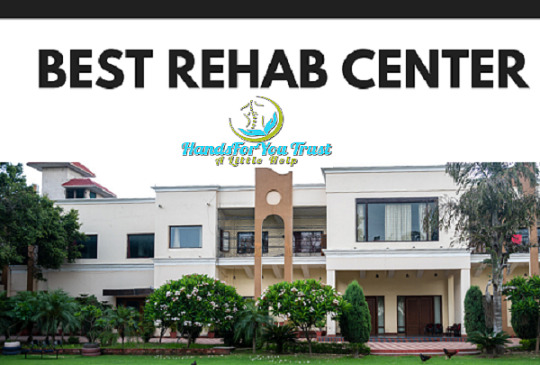
Effects on the Liver:
Fatty Liver Disease: Heavy alcohol consumption can lead to the accumulation of fat in the liver, a condition known as fatty liver disease. This condition can progress from simple steatosis to more severe forms of liver damage if alcohol consumption continues unabated.
Alcoholic Hepatitis: Alcohol addiction & abuse can cause inflammation of the liver, known as alcoholic hepatitis. This condition can range from mild to severe and is characterized by symptoms such as jaundice, abdominal pain, and liver enlargement.
Cirrhosis: The most severe consequence of chronic alcohol abuse is the development of cirrhosis, a progressive scarring of the liver tissue. Cirrhosis disrupts the normal function of the liver and can lead to complications such as portal hypertension, ascites (fluid accumulation in the abdomen), hepatic encephalopathy, and liver failure.
Liver Cancer: Chronic alcohol consumption is a significant risk factor for the development of liver cancer, particularly in individuals with underlying liver diseases such as cirrhosis.
Effects on the Heart:
Cardiomyopathy: Long-term alcohol abuse can weaken and damage the heart muscle, leading to a condition known as alcoholic cardiomyopathy. This condition can result in symptoms such as shortness of breath, fatigue, and swelling of the legs and ankles.
Arrhythmias: Alcohol consumption can disrupt the normal rhythm of the heart, leading to irregular heartbeats or arrhythmias. These abnormalities in heart rhythm can increase the risk of more serious cardiac events such as stroke or sudden cardiac death.
Hypertension: Excessive alcohol intake is associated with elevated blood pressure levels, which can contribute to the development of hypertension (high blood pressure). Hypertension is a major risk factor for heart disease, stroke, and other cardiovascular complications.
Increased Risk of Heart Disease: Chronic alcohol abuse is linked to an increased risk of developing various cardiovascular diseases, including coronary artery disease, heart attack, and heart failure.
If you or anyone you might know is searching for Drug Addiction Treatment in Mumbai, then you don’t have to worry about anything at all because Hands For You is here to help you with addiction.
About Hands For You
Hands For You is one of the leading rehab centers, which offers a wide range of rehab programs to everyone. To know more details about the rehab treatment, you can visit us or contact us.
Credit:- https://penzu.com/p/7baf4883c49a2191
0 notes